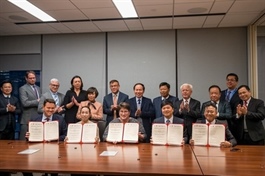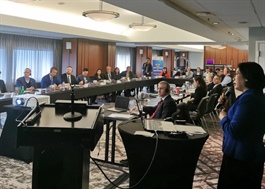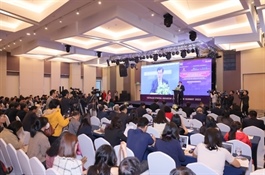New mindset advised for sharing economy
New mindset advised for sharing economy
State management agencies have failed to clearly determine the business line of various providers in the sharing economy, leading to poor regulation and several industry-wide shortcomings.

At last week’s conference on the sharing economy held by the Central Institute for Economic Management (CIEM), Nguyen Cong Hung, vice chairman of the Vietnam Automobile Transportation Association said a standout example of mismanagement is in transportation.
Currently, the Ministry of Transport manages transport and the Ministry of Industry and Trade manages e-commerce and platforms, so there is no clear delineation of management responsibilities for tech companies that work in both areas.
“The initial target plan was to call for individuals with idle cars to participate in transport activities. However, there are several shortcomings,” Hung said. “Drivers of ride-hailing platforms are not strictly managed, not in serious compliance with traffic safety regulations, and the hours of driving time completely depend on the driver’s self-discipline.”
Since Uber entered the transport market as a ride-hailing platform, many similar applications like Grab, Be, Gojek, Dichung, and Fastgo have entered the market. Hung said they were working in the transport industry but not being managed by the conditions of the transportation business because these technology companies were not clearly identified as under any particular purview.
“Besides this, transport activities carried out through social networking platforms are very active, but there are still no specific legal provisions to manage it,” Hung added.
“The application of the sharing economy to the wrong target group has led to the massive emergence of new modes of transport, while the legal framework and management measures are not ready. This is disrupting local transport planning, causing tax revenue loss, and inequality among entities participating in the transport business,” Hung said.
Dang Thi Thuy Trang, head of Public Affairs at Grab Vietnam, said that while the government encouraged a sharing economy, there were many restrictive regulations. Decree No.10/2020/ND-CP on the auto transport business does not allow contract vehicles to sign multiple contracts in one trip, for example.
“This restricts the deployment of services that allow passengers to share journeys, as with a bus. Therefore, we recommend amending the regulations to allow ride-sharing services on the same contract ride, especially shared rides that are connected and arranged clearly on ride-hailing platforms,” Trang said.
Luu Huong Ly from the Ministry of Justice’s Civil-Economic Legislation Department said that the key difficulty was the confusion in identifying and determining the legal nature of the businesses providing platform services.
“Legal adjustments should focus on handling and limiting risks to workers and consumers in the sharing economy, and risks of personal data infringement,” Ly said.
CIEM vice president Luong Van Khoi said that after four years of implementing Decision No.999/QD-TTg on approving the promotion of the sharing economy, the model in Vietnam had yet to develop as strongly as in other countries.
“The sharing economy is a new model, but not a separate part or a separate economic component of the economy. It is not necessary to make policies for this business model only. Most importantly, we should change the mindset and state management measures to catch up with the trend of the digital economy and Industry 4.0,” he said.
Khoi suggested that the state management should create an equal business environment between businesses in the sharing economy and traditional ones, between local and foreign-invested enterprises, and facilitate and support traditional businesses to transform and local tech firms to develop further.
Nguyen Binh Minh, a representative of the Vietnam E-commerce Association, proposed several solutions to sustainably develop the sharing economy, such as responsible e-commerce business, quality goods with traceability, environmental protection, and training in sustainable e-commerce.
“We should coordinate numerous digital tools, and develop digital business platforms in a healthy direction; promote transformation in localities, and narrow the digital gap. Also, the legal corridor on e-commerce and protecting consumer rights should be improved as soon as possible,” Minh said.



























